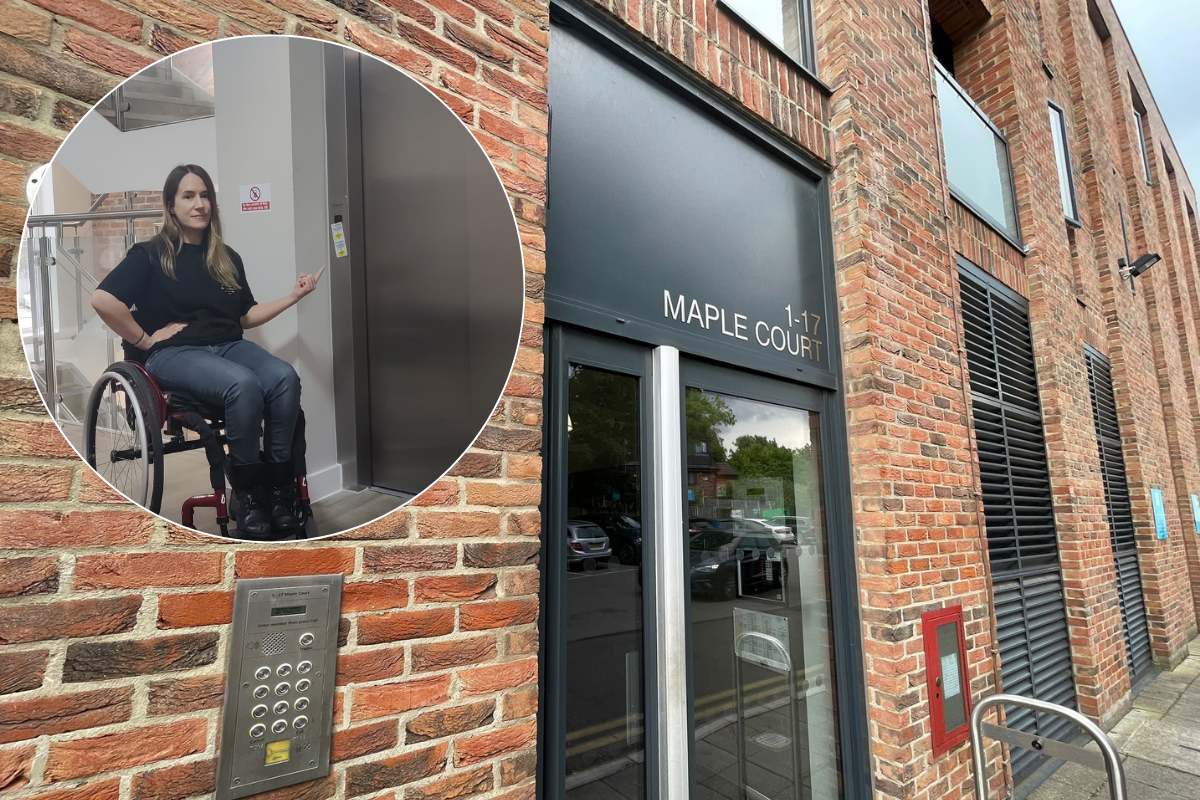£1,149-a-night private Altrincham Priory Hospital failed to refer headteacher to NHS days before he killed himself
Inquest, a charity concerned with state related deaths, said there is a culture of complacency at the Priory Group - and that public money should not be used to fund private provision
Staff at a £1,149-a-night private hospital in Altrincham failed to refer a mentally ill headteacher to the NHS when he was discharged - just six days before he killed himself.
If workers at the Priory Hospital in Rappax Road had referred Benjamin Sulzbacher to the national health service’s home-based treatment team, it would have seen him face-to-face within 72 hours and, if needed, kept in touch with him for up to four weeks, an inquest was told.
But there was confusion around what help the rabbi could get on the NHS - and he was left to suffer a relapse and die from suicide in Philips Park, where he was reportedly found dead by a long-time friend.
Manchester North’s senior coroner Joanne Kearsley has now written to health bosses warning of more deaths unless something is done.
She told Priory boss Rebekah Cresswell, Health Secretary Victoria Atkins and Mark Fisher, chief executive of the NHS Greater Manchester Integrated Care Board: “I believe each of you respectively have the power to take such action.”
Father-of-eight Sulzbacher, 48, who had worked as the head of Manchester Mesivta School, was described at the inquest into his death as a “pillar of the community”.
He was taken to A&E at North Manchester General Hospital last August after he “tried to tie a ligature at home”, Kearsley said.
He was assessed and found to be in need of admission, which he agreed to, but the only available acute inpatient bed was in the south, so his family paid for a private admission at the Priory, where he stayed from August 26 to September 18.
Medics at the Priory, which was judged to be ‘good’ after its last routine inspection by the health industry regulator Care Quality Commission (CQC) in 2019, were meant to carry out a follow-up phone call within 48 hours of discharge, Kearsley said.
But the call only happened on September 21, three days later, with Kearsley saying “learning from how this call was conducted has already been recognised by the Priory”.
And she said: “The court heard evidence that no referral was made to the NHS mental health trust for a follow up via the home-based treatment team.”
Kearsley added: “This would have occurred automatically if he had been an NHS inpatient.
“The court also heard evidence that the NHS trust would have accepted such a referral even though Sulzbacher had been a private-paying inpatient.”
Action to prevent more deaths
Addressing Priory chief executive Cresswell, the coroner wrote in her regulation 28 report, sent when action is needed to prevent more deaths: “There was a lack of understanding from the Priory witnesses as to what the NHS community services could offer on discharge. The court heard that the home-based treatment team was understood to simply be a ‘crisis team’, which was incorrect.”
And to Atkins and Fisher, Kearsley said: “It was unclear to all services as to whether a private-paying inpatient - who would have qualified for care under the NHS but due to bed availability went private - would be entitled to be referred to the discharge services offered by the NHS.
“The NHS provides more than the private sector in respect of community discharge packages and can be engaged with someone for longer.
“Importantly, the face-to-face contact enables a better understanding of how a patient is actually presenting when considering their mental health.”
The NHS Greater Manchester Integrated Care Board said it would not answer The Altrincham & Sale Lead’s questions until it has responded to the coroner, who has given a deadline of July 12.
The Altrincham & Sale Lead also asked the Department of Health and Social Care a number of questions; a spokesperson declined to comment because they said doing so would breach pre-election period guidance.
Speaking at the inquest, Sulzbacher’s son-in-law Alex Whittler said: “He was an incredible role model and loved by everyone. He was an extremely special person - very genuine and real.”
Sulzbacher began to experience anxiety and depression in February 2021, the inquest was told, according to the Bury Times.
In the months before his hospital admission he was “struggling” because of stress at work and feared losing his job.
Last August, Sulzbacher threatened to kill himself and was seen with rope, which he put in the back of his car, the court was told.
An ambulance was called and he was later admitted to the Priory.
Sulzbacher’s loved ones are said to have voiced their concerns after he was found with another ligature at the hospital three days after his arrival and after they were told he would be eligible for a two-day trip home from September 8-10.
Whittler said: “This was 10 days after being admitted, being actively suicidal. We couldn’t get our heads around it.”
When Sulzbacher was discharged on September 19, his family was not told and he arrived home in a taxi, the inquest was told.
“We didn’t see any discharge papers,” Whittler said. “There were no plans in place.”
"Robust protocal"
A spokesperson for the Priory, which says on its website it offers “specialist mental health treatment that can put you on a path to a positive, fulfilling future”, told The Altrincham & Sale Lead: “Patients and families are always involved in choices about discharge arrangements and aftercare.
“Priory has a robust protocol in place re post-discharge management and patients who do not have a follow-up appointment scheduled with an NHS service receive a call within 48 hours of discharge which is the process followed with Sulzbacher.
“Where patients indicate that they want to re-engage with NHS services, referral letters need to be sent not only to GPs (as is standard practice) but also to NHS community treatment teams so they can follow up directly with the patient within the expected 72 hours and this will be reinforced across Priory following the coroner’s report.
“Where a patient does not require further NHS input, we continue to ensure a follow-up call is made by Priory within 48 hours in accordance with current practice.”

Priory Hospital, Altrincham
This is not the first time concerns have been raised about the Priory’s facility in Altrincham.
The hospital was subject to an unannounced inspection in March 2019 after “an incident following which people using the service sustained serious injuries”, the CQC said.
“This inspection was conducted to ensure that at the time of this inspection, patients were receiving safe care and were protected from avoidable harm,” the watchdog said.
Inspectors visited two acute wards for working-age adults - the Dunham ward with 24 unisex beds and Tatton ward with 17 unisex beds.
They found that both were “safe, generally clean, well equipped, well furnished, well maintained and fit for purpose”, documents showed.
They added: “The service had enough nursing and medical staff, who knew the patients and received basic training to keep people safe from avoidable harm.
“The wards had a good track record on safety. The service managed patient safety incidents well. Staff recognised incidents and reported them appropriately. Managers investigated incidents and shared lessons learned with the whole team and the wider service.
“When things went wrong, staff apologised and gave patients honest information and suitable support.”
But two years ago, an investigation by a national newspaper revealed a “deeply worrying pattern of deaths” at the Priory, one of the biggest mental health services providers in the country, as a company.
It followed the death of patient Matthew Caseby, 23, who was hit by a train after scaling a fence at the Priory’s hospital in Birmingham.
The publication said that, days after Caseby’s inquest, a 20-year-old student was found hanged from a ligature point in her room that was supposed to have been removed.
“If there is a single issue that unites bereaved families - we have spoken to a number over the past few weeks - it is the continued ‘outsourcing’ of mental health services to companies such as the Priory, which has been accused of putting profits before patients,” it wrote.
“The Priory has become synonymous with celebrities recovering from drink or drug addiction at the brand’s flagship hospital in Roehampton.
“But the majority of patients at more than 300 Priory clinics all over Britain are paid for by the NHS; the taxpayer, in other words.
“The Priory, which gets at least £400 million a year in lucrative NHS contracts, is now the biggest provider of mental health services in the country.”
A culture of complacency?
Deborah Coles, director of the charity Inquest, told The Altrincham & Sale Lead: “There is a culture of complacency at the Priory Group, who put profit before patient safety.
“We can no longer tolerate the use of public money to fund private provision which is failing to keep people safe.”
The Priory’s hospital in Altrincham, based in a grade II-listed building, has three inpatient units providing care for adults with a range of mental health issues and young people with eating disorders. It also offers an adult addiction rehabilitation and treatment programme, its website said.
At its last full CQC inspection, in November 2018, it was judged to be ‘good’ overall and in the five core areas around safety, effectiveness, levels of caring, responsiveness and leadership.
The regulator said in a report: “Patients using the service told us that they were treated with dignity and respect and described the staff as caring and helpful. We observed that staff took time to communicate with patients in a respectful and compassionate manner and patients were empowered to become active participants in their care.”
It added: “All patients underwent an assessment of need, care plans were holistic and recovery-orientated and included physical health assessments; these were completed in collaboration with the patients; progress was regularly reviewed.”
Sulzbacher, who was reportedly born in London, was appointed as headteacher of Manchester Mesivta School, formerly Manchester Jewish Grammar School, in 2011, the Jewish Chronicle said.
He stepped down at the end of the last academic year and was due to stay on as leader of religious studies, though he announced just before the start of the new academic year that he would be leaving that role too.
The school’s foundation governor, Tim Dempsey, told the JC: “Rabbi Sulzbacher was a dedicated and skilled headteacher and menahel (manager). Under his tenure, the school doubled in size and saw hundreds of boys graduate to yeshival, university and through to fulfilling careers.
“His swift action at the beginning of lockdown saw the school move online almost seamlessly and he worked hard to maintain pastoral care during that period."
Sign up to The Altrincham & Sale Lead for free for more of our news, features, recommendations and investigations.
You can see the previous newsletter we sent to our subscribers.
The Lead is now on Substack.
Become a Member, and get our most groundbreaking content first. Become a Founder, and join the newsroom’s internal conversation - meet the writers, the editors and more.





